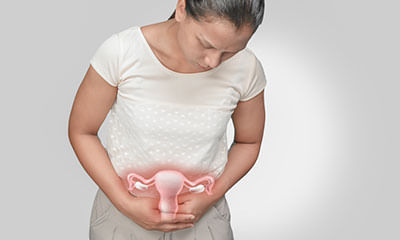Ayurveda For PCOS!
Ayurveda believes that three ‘doshas’ or forces of energy – vatta, pitta and kapha – circulate in the body and facilitate important bodily functions. In healthy individuals, all three doshas are in perfect harmony. According to Ayurveda, any imbalance in the three forces of energies can lead to diseases.
Ayurvedic texts mention the presence of Shukra dhatu (semen) in both men and women. Shukra dhatu plays a vital role in maintaining the health of the reproductive system. Shukra dhatu can be considered as a combination of androgen (male hormone) and estrogen (female hormone). Any imbalance in Shukra dhatu can cause infertility.
An imbalance in the doshas can affect the efficiency of the Shukra dhatu. When “doshas” affect the efficiency of the Shukra dhatu in women, it leads to excess production of male hormones and other symptoms of PCOS such as the appearance of cysts in the ovaries.
PCOS treatment in ayurveda, just like any other ayurvedic treatment, focuses on correcting the imbalance of the doshas or forces of energy.
Ayurveda: Do’s And Don’ts For PCOS Patients
According to Ayurveda, here are some do’s and don’ts for patients of PCOS:
- Minimize the intake of dairy products, including curd and other milk products. Butter milk is an acceptable drink.
- Follow a natural sleep cycle. Avoid sleeping during the day time and try to get uninterrupted sleep during night.
- Stay away from all kinds of junk food
- Avoid white sugar
- Avoid non-vegetarian food. Though Ayurveda allows an occasional intake of fish.
- Use herbs like garlic, cinnamon, and fenugreek. For example, having fenugreek seeds water (soaked overnight) can do wonders for keeping your blood sugar under control.
- Opt for herbal teas like spearmint tea or green tea
- Eat healthy fats like ghee
- Yoga Asanas For PCOS
Ayurveda also recommends specific yoga asanas for PCOS. These include:
- Naukasana (Boat Pose)
- Bhadrasana (Butterfly Pose)
- Sarvangasana (Reverse Body Or Shoulder Stand Pose)
- Shalabhasana (The Locust Pose)
- Bharadvajasana (Bharadvaja’s Twist)
- Padmasana (Lotus Pose)
21 Powerful Herbs For PCOS Treatment In Ayurveda
PCOS treatment in Ayurveda involves using a combination of powerful herbs that strengthen the reproductive system. These herbs also treat inflammation and hormonal imbalance that are at the root of PCOS. Certain herbs also work against other complications of PCOS such as digestive disorders, weight gain, insulin sensitivity, and improving mood. In essence, these herbs perform the same function as allopathic medications for treating the different symptoms of PCOS.
1. Shilajit (Purified Asphaltum)
Shilajit has anti-inflammatory effects. It also boosts immunity and energy levels and rejuvenates the female reproductive system. Many women with PCOS experience heavy bleeding, which increases the risk of an iron deficiency. Shilajit is known to increase iron levels. It also improves heart health
2. Shatavari (Asparagus Racemosus)
Shatavari is rich in various steroidal saponins, vitamins A, B1, B2, folic acid, C, E and minerals such as magnesium, phosphorus, calcium and iron. These act as antioxidants and protect the female reproductive system. Shatavari also has anti-diabetic properties that help improve insulin sensitivity. This herb also helps in improving fertility.
3. Karavellaka (Momordica Charantia)
This bitter fruit has potent anti-diabetic properties. It also treats digestive disorders, lowers inflammation, boosts immunity and prevents cancer. It helps women with PCOS by regulating their periods and assisting in weight loss.
4. Haridra (Curcuma Longa)
Turmeric is known as the “friend of women.” Its benefits for women with PCOS are immense. It improves complexion, reduces acne, detoxifies the female reproductive system, helps in weight loss, and improves insulin resistance.
5. Vibhitaki (Terminalia Belerica)
Among the many health benefits of this plant, it has a positive effect on improving sugar metabolism. It also promotes hair growth and stops hair fall. This property makes it an ideal herb for PCOS. Vibhitaki also has anti-inflammatory and antimicrobial properties and also cures digestive ailments.
6. Darusita (Twak) (Cinnamomum Zeylanicum)
Cinnamon helps in regulating blood sugar levels. It also improves insulin sensitivity and boosts fertility.
7. Guduchi (Tinospora Cordifolia)
This herb helps in regulating blood sugar levels. It is an immune booster and also boosts female sex drive. It is a potent liver tonic and is used to treat liver conditions like hepatitis. It also effective against many different types of cancers.
8. Neem (Azadirachta Indica)
Neem is an effective blood purifier and helps keep skin healthy. It is highly effective in treating acne and all kinds of skin disorders. It helps hair growth and regulates blood sugar levels.
9. Amalaki (Emblica Officinalis)
Amalika or the Indian Gooseberry (Amla) is a highly revered fruit in Ayurveda. It has been a part of the Indian subcontinent diet since ages. The fruit is rich in vitamin C, a potent antioxidant. It reduces inflammation and oxidative stress. It is also helpful in reducing weight. It is good for the heart, aids digestion and strengthens the immune system.
10. Ashoka (Saraca Indica)
Saraca indica helps in repairing the endometrium and heals the damage caused to its sensitive lining by inflammation. It also helps in regulating estrogen levels. It is rich in anti-inflammatory compounds. It also It has antimicrobial and antifungal activity and helps in protecting the urinary tract from bacterial and fungal (especially Candida) infections.
11. Lodhra (Symplocos Racemosa)
Lodhra is rich in compounds called flavonol glucosides that are highly beneficial in reducing uterine disorders. It also helps in regulating ovarian hormones and improves fertility.
12. Haritaki (Terminalia Chebula)
Terminalia chebula is rich in vitamin C and minerals like selenium, potassium, manganese and copper. It is a digestive tonic and has been found effective on a variety of disorders like constipation, flatulence, colitis, etc. It has antibacterial, anti-tumor and anti-inflammatory properties. It also helps in protecting the heart, improving appetite and regulating mood.
13. Usheera (Vetiveria Zizanioides)
Vetiver oil has muscle-relaxing activity and reduces uterine cramping. It has a cooling effect on the body. It is also effective in curing and healing skin disorders. Usheera also helps in relieving fatigue and aids in digestion. It is also beneficial for diabetics.
14. Nagara (Zingiber Officinale)
Commonly known as ginger, it is the world’s most popular and versatile home remedy. Women with PCOS are at an increased risk of developing endometrial cancer as opposed to normal women.With its potent anti-cancer activity, it protects the uterus from cancer and also from infections. It is a digestive tonic, protects the heart, relieves constipation and helps reduce menstrual pain.
15. Devadaru (Cedrus Deodara)
Known for its anti-inflammatory and muscle-relaxing activities, this herb reduces menstrual cramping and pain and also relieves inflammation. It is also useful against diabetes as well in treating obesity.
16. Ashwagandha (Withania Somnifera)
Ashwagandha is an excellent adaptogen (a substance that helps the body in adapting to internal and external stresses.) It also helps in controlling mood swings and is a natural energizer.
17. Yashad Bhasma (Zinc Calx)
Zinc is an immune booster and a blood sugar regulator. As the second most abundant mineral in the body, it plays an important role in many different biochemical processes.
18. Jambu (Eugenia Jambolana)
Java plum, better known as “jamun” in India (Hindi), helps in regulating blood sugar and cholesterol levels. It also has anti-cancer and liver-protective properties. Jambu can also assist in reducing weight.
19. Meshashringi (Gymnema Sylvestre)
This herb is a potent anti-diabetic. It improves insulin sensitivity and is also vital for uterine health.
20. Vrikshamla (Garcinia Cambogia)
This citrus fruit is rich in a chemical called hydroxycitric acid (HCA), which supports fat and carbohydrate metabolism. It helps in managing appetite and protects you from urges of binge eating. It also helps in maintaining optimum body weight.
21. Kirat Tikta (Swertia Chirata)
Chirata is a potent anti-inflammatory. It also has blood sugar regulating activities. It boosts immunity, keeps liver healthy and also fights skin disorders.
PCOS Treatment In Ayurveda: Final Thoughts
Ayurveda is not only about herbal medicines. In fact, the basic philosophy of Ayurveda advises on healthy ways to live life. The word “Ayurveda” itself means the “Science of Life.” I always say medicines are a last resort for treating any condition. In order to be healthy, you need to eat right, exercise regularly and manage your stress levels.
For the herbs to do their job effectively, you need to take care of what you are eating and how you are living your life. If you do so, there’s no stopping you from reversing PCOS or any other lifestyle disease.
In case you have a concern or query regarding sexual health ask a doctor online, you can consult the best sexologist doctor online, & get the answers to your questions.



+1.svg)
